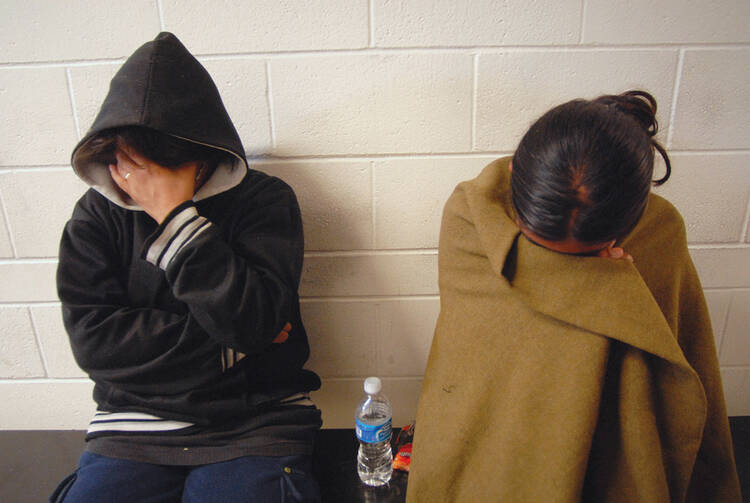Sexual harassment is an epidemic in the fields of the food we eat. On June 25, PBS and Univision debuted a documentary in the series “Frontline” entitled “Rape in the Fields.” This report exposed the hidden reality of sexual abuse of women who supply American tables with apples, almonds, lettuce and eggs—untold numbers of women and girls subject to sexual abuse and rape by their male bosses and co-workers.
Since harassment is commonplace and takes place in the isolation of the vast agricultural fields, migrant women often refer to camps as the “fields of panties” or the “green motel.” Rendered invisible in U.S. society by a broken immigration system that simultaneously demands cheap migrant labor and criminalizes undocumented persons, migrant women evade contact with the legal authorities responsible for responding to these crimes. Sexual perpetrators exploit this legal and social invisibility to take sexual advantage of them.
Like sexual violence in general, abuse in the fields is severely underreported. In 1995, the Equal Employment Opportunity Commission began investigating sexual abuse cases. This work yielded several lawsuits against agricultural companies in which victims pursued damages for the harm inflicted upon them. The courageous actions of the victims and the E.E.O.C.’s legal efforts encouraged more women to come forward with their stories and enter the difficult process of investigation and prosecution. These cases are hindered, however, by a supposed lack of evidence to support the testimonies of dozens of abused women. To date, no cases pursued by the E.E.O.C. have resulted in criminal investigations.
The pursuit of justice is also hindered by the threat of detention, deportation and loss of livelihood that destroys migrant families. Paul Shultz, the former sheriff of Wright County, Iowa, explains that his office was obligated both to apprehend undocumented persons and to respond to cases of sexual abuse. This double-edged sword resulted in distrust of local authorities among migrant women in the community. Despite overwhelming numbers of suspected abuse cases, migrant women never turned to Sheriff Shultz and his police force for help. On May 12, 2008, Agriprocessors Inc., a kosher slaughterhouse and meatpacking facility in the Wright County town of Postville, was the site of the largest Immigration and Customs Enforcement raid in U.S. history, resulting in the arrest of nearly 400 undocumented persons. Enforcement agents did not ask the detainees whether they had been victims of crime; both victims and perpetrators were arrested and deported back to their countries of origin. Any unreported crimes involved will never be brought to justice in the United States.
The rape of migrant women is but one violation of workers’ rights and human dignity common in U.S. agricultural fields. Undocumented women and men are subject to human trafficking and modern day slavery, wage theft, exposure to hazardous pesticides, family separation and other violations of economic, human and legal rights. Equally disturbing is the public ignorance about these abuses. Invisibility perpetuates a cycle of exploitation of those whose labor sustains people in the United States. The horror and scope of migrant exploitation presents a dilemma for Christian social ethics: how can Catholics respond to a problem hidden from our sight?
If the sexual abuse of migrant women is a crime that feeds on invisibility, then the church ought to respond by making this suffering visible. Pope Francis’ first encyclical, “The Light of Faith,” offers theological insight into the relationship between vision and faith. The encyclical invites believers to see with the eyes of Christ, where seeing “becomes a form of following Christ, and faith appears as a process of gazing, in which our eyes grow accustomed to peering into the depths.” Rather than simply gazing upon Jesus as an object of adoration, the believer is invited to participate in Jesus’ way of seeing the social, economic and political “signs of the times.” This way of seeing looks beyond the horizon of one’s own daily context toward recognizing another’s suffering. It demands that the believer peer beneath the surface of economic arrangements to recognize the anti-sacramental abuses connected with the agricultural economy in this country. This transformed gaze brings to light the fundamental human dignity of workers who have been cast into the shadows of the global economy.
Not all forms of seeing affirm human dignity. As the theologian Laurie Cassidy argues, some portrayals of human anguish transform suffering into a commodity without recognizing the humanity of the one who suffers. It is easy to view the anguish of others at a distance without true compassion. For Catholics, however, seeing with the eyes of Christ calls us to see suffering in conjunction with the fundamental human dignity of the one who suffers. It calls us to foreground the imago dei—the image of God—present in every person. This new sight resists the exploitative leer that fosters pity more than solidarity; it searches for a response to human suffering grounded in human dignity.
Catholics must therefore encounter through the eyes of Christ the faces and narratives of women resisting sexual abuse in the fields. This new way of seeing moves Catholics to respond to migrant exploitation in concrete ways that recognize and foster human dignity. This new vision reveals the necessity for broader education on the conditions faced by undocumented migrant women and men living in the United States. It uncovers the urgent need for immigration policies that acknowledge and uphold the value of human life. It makes plain the responsibility of consumers to support migrant-led efforts to develop and implement human rights standards for agriculture and other businesses that employ vulnerable workers. Seeing migrant women through the eyes of Christ enables the church to align itself more clearly with the cause of human dignity.








